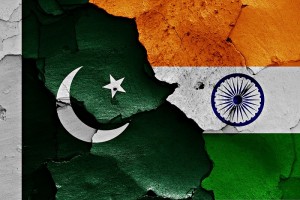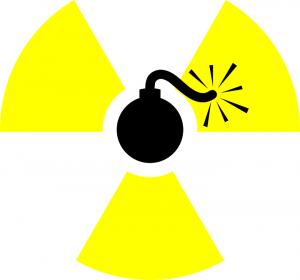Nuclear Doctrine of Pakistan
Offensive or Defensive?
Mian Majid Ali Afzal
South Asia could not be isolated from the worldwide enthusiasm towards atomic energy after China’s nuclear tests of 1964. India, with the help of the United States, had already started its nuclear program on 2 March 1944 – nuclear physicist Homi Bhabha, who is Colloquially known as the ‘father of the Indian nuclear programme’, began persuading the Indian Congress towards the harnessing of nuclear energy and a year later he established the Tata Institute of Fundamental Research (TIFR). Indian programme started more than a year before the ‘Trinity’ nuclear test and about a year and a half before the bombing of Hiroshima and Nagasaki, over three years before the country’s independence. Pakistan, after India’s tests in 1974, also followed the suit. During the 80s and early 90s, the debate was whether the two countries actually had the nuclear capability or they were just ‘paper tigers’. Whatever the scenario, one thing is clear: this situation successfully averted wars between the two countries in that period of time. The debate settled with the successful tests by both India and Pakistan in 1998. The ensuing debate and major questions were related to nuclear policies and postures of both countries.
In 1999, India presented the draft nuclear doctrine, and in 2003 adopted its nuclear doctrine. Pakistan, however, has not adopted any doctrine or clear-cut policy regarding its nuclear weapons. But, some semblance of Pakistani doctrine can be inferred from the actions taken by its ruling elite and state institutions.
Indian Doctrine: contextualizing Pakistan’s nuclear policy
The nuclear policy of a state cannot be delinked from its foreign policy and national aspirations. Discussion on Pakistan’s nuclear posture is determined by its hostile relations with India – the country’s archrival that has always been a threat to its ideology, national security and territorial integrity. The debacle of East Pakistan still resonates in the strategic thinking of Pakistan. Moreover, nuclear weapons were also pursued in a reaction to the Indian programme. This, for instance, shows that any nuclear posture will always be contextualized concerning India.
The second factor that would determine Pakistan’s doctrine is the policy India adopts. Pakistan, after conducting its nuclear tests at Chagai in May 1998, hoped that India would stop gaining the nuclear shield. However, this was not the case as India quickly factored in China – evident from Indian Prime Minister Atal Bihari Vajpayee letter to Clinton in 1998, wherein he tried “to explain the rationale for the tests”.
This was reflected in the doctrine and is evident in the Indian arms race policy. In the doctrine, adopted in 2003, Indian state assumed minimum credible deterrence, No First Use (NFU) policy and massive retaliation. These, however, may seem quite modest targets, but considering China, it gives India a broad room for increasing the arsenal.
So, Pakistan’s policy will always be tailored keeping in view the Indian designs and the context in which the program was developed.
Pakistan’s Ambivalent Doctrine
Pakistan has not yet adopted a clear-cut nuclear doctrine and has deliberately veiled its policy. It has kept all options open. It has never adopted a No First Use policy. It has never shown willingness to engage in the arms race with India, albeit forced to do so. The one thing which is clear as day is that Pakistan’s posture has evolved over time. It has been evolved from minimum credible deterrence to full-spectrum deterrence. Its increasing missile capabilities have given it broad deterrence, and somewhat complemented its relatively inferior conventional forces.
The Question of Being Defensive or offensive
Military deterrence is a realist concept. In realism, there is a debate between offensive and defensive realists. Both have a fine line between them. According to some, Pakistan has a defensive strategy that provokes offensive strategy. The same is true for nuclear doctrine to determine whether it is offensive or defensive. Like I mentioned before, the centre of Pakistan’s policies will be judged by history and its present context and geopolitical realities. For Pakistan, it can be said that it may be labelled as offensive but from its core it is defensive.
Secondly, it is the acceptance of low technological base with conventional faces which makes Pakistan’s policy defensive
The most important thing which points that Pakistan’s nuclear doctrine is defensive is the missing element of support of the ideological base. Its adversary is many times bigger. India, for instance, had Cold Start, a clearly offensive doctrine. Pakistan, in response, adopted strategic depth, a purely defensive one. If we go a little back in the era of East-West Pakistan, Pakistan’s policy was that the defence of East Pakistan lies in West Pakistan. That thinking is still present in military thinking.
Another impediment in the way of offensive doctrine is the low resource-base. Any smaller country, having an adversary much bigger than it, will always adopt a defensive attitude, for an offensive policy may legitimize the counter-offensive of larger and more resourced nation.
Jumping the offensive ladder
Pakistan will have to provide any such policy with offensive backing. An offensive policy would contain either preventive war option or preemptive strike option. For that, robust conventional forces are required. An additional quality would be an ideological backing, which must be expansionist. In Cold War, the US had liberal; USSR had Communist and even India has one, i.e. Akhand Bharat. That is why an offensive doctrine will require ideological backing. Pakistan can make its policy offensive by leading the arms race both conventional and unconventional. For this, it will have to employ huge economic and human resources.
There will always be a debate about regional stability with respect to nuclear weapons due to complex alliances. Pakistan, India, China and Russia all factor in. If these were not enough, Indian relations with Israel and USA would also determine any regional policy. Keeping this in view, Pakistan has maintained a successful policy regarding nuclear weapons. However, if the need arises Pakistan has the option to adopt an offensive policy.
The writer is a member of Anti-Drug Task Force Punjab.
 Jahangir's World Times First Comprehensive Magazine for students/teachers of competitive exams and general readers as well.
Jahangir's World Times First Comprehensive Magazine for students/teachers of competitive exams and general readers as well.




